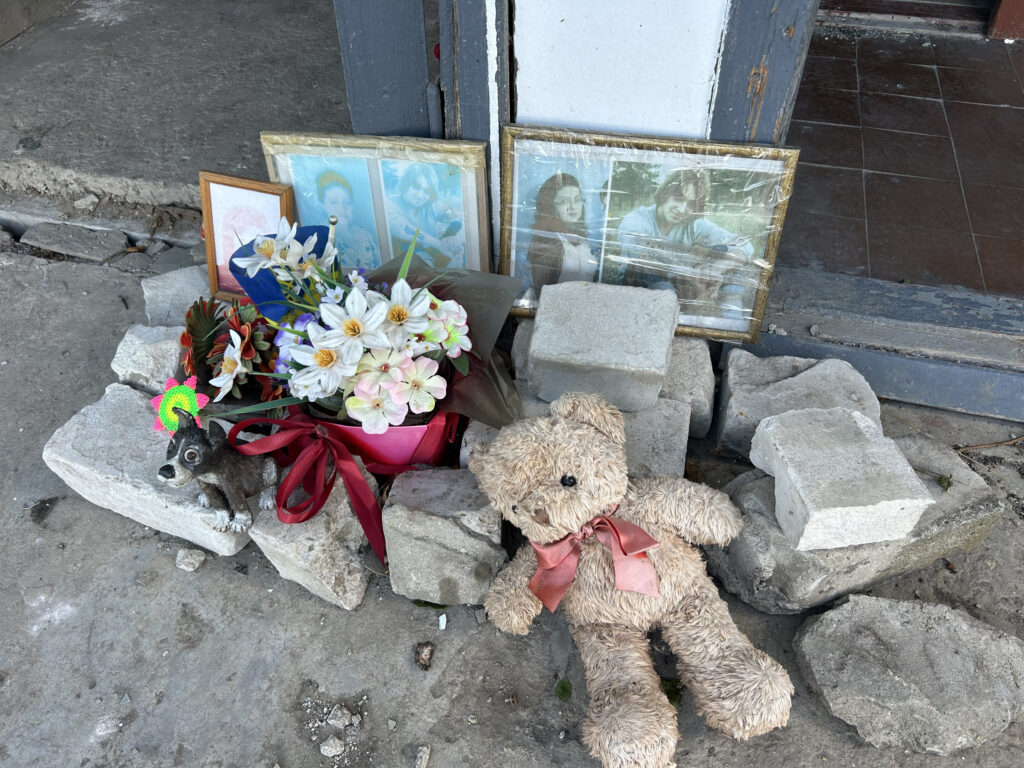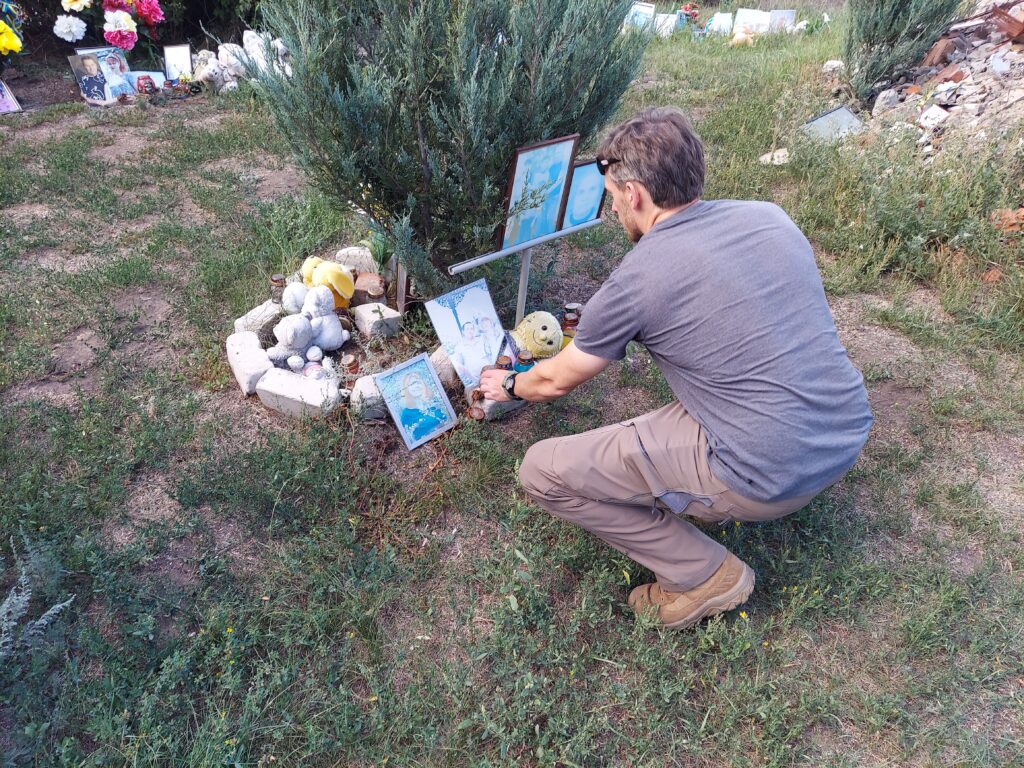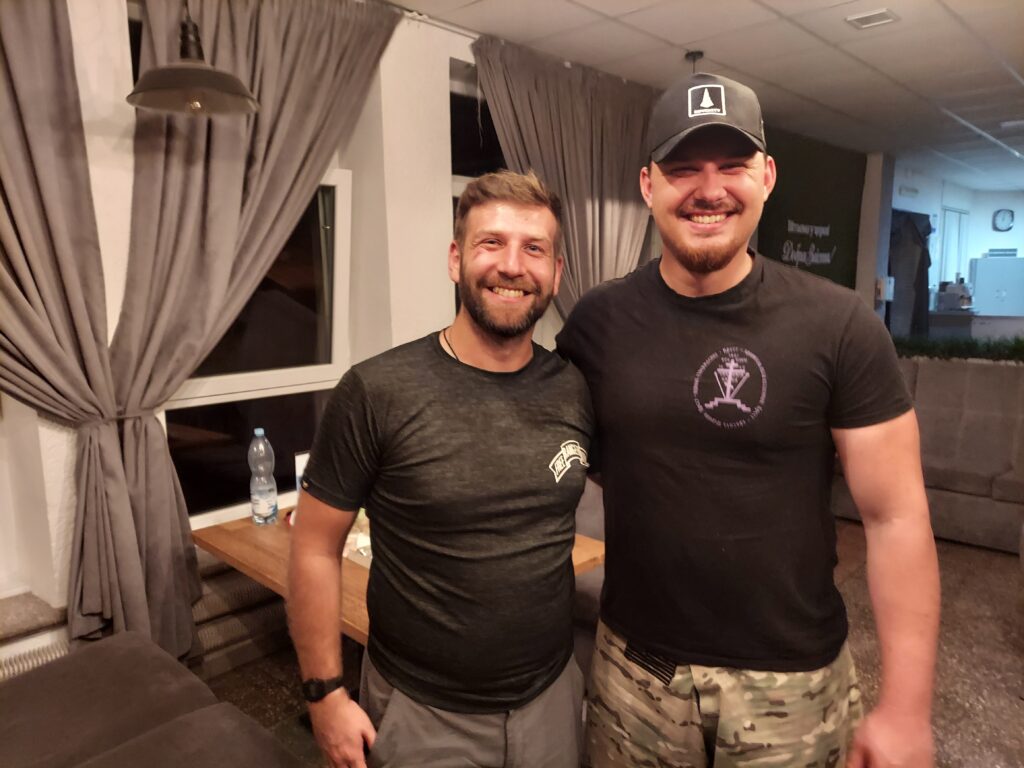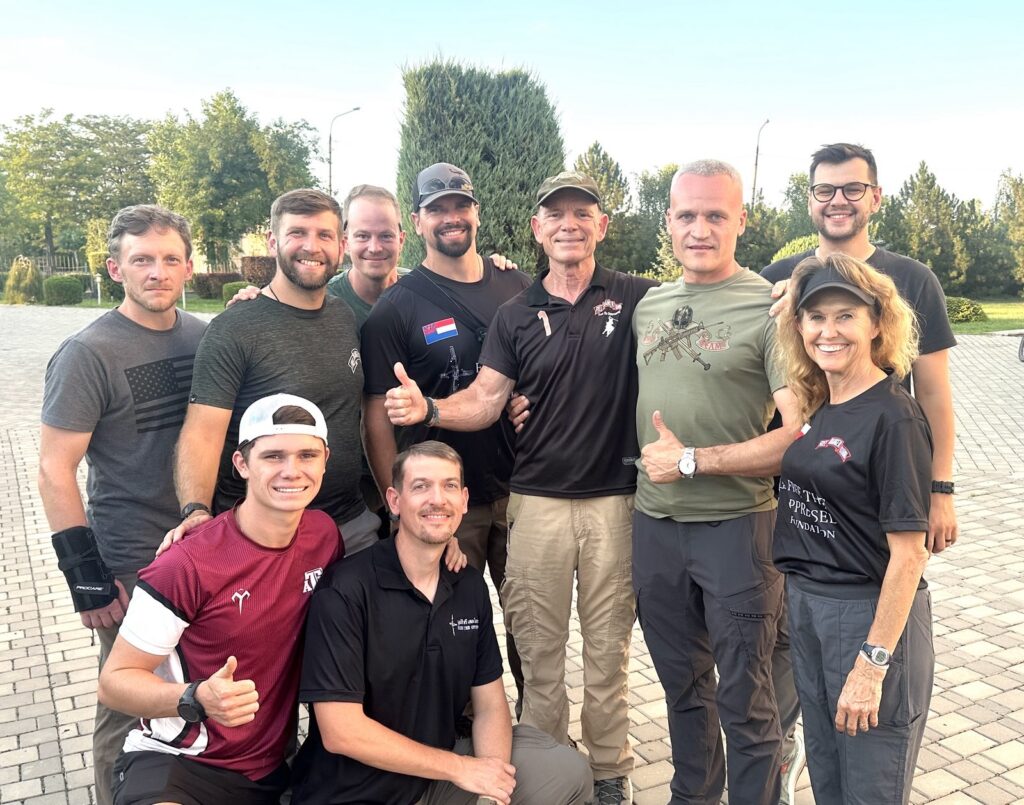Mourning and Hope in Ukraine
20 August 2025
Donetsk Oblast, Ukraine
In my work with FBR, whether on mission or in the office, mourning is part of the deal. I mourn when I see the picture of a husband crying over his dead wife. I mourn for the Ranger killed as he was trying to evacuate people, leaving behind a wife and baby boy. I mourn for the refugee leader who’s overwhelmed by the needs of her people, and so very homesick. It’s difficult to be with hurting people and not mourn what they are going through with them. So when I got invited to go on the recent FBR mission to Ukraine last month, I tried to prepare myself to have my heart broken, once again, for hurting people. We were going to Ukraine to fulfill a promise Dave gave to return and help a friend in Kramatorsk, Donetsk Oblast. While we were there, we also gifted about $15,000 of protective equipment to police in a frontline community, met with and encouraged Ukrainian soldiers and church leaders, and also helped evacuate civilians trapped near the frontline by the threat of Russian drones hunting anyone out in the open. I was the designated FBR reporter on the mission, which meant it was my job to collect interviews and media to capture as much of the story of the mission as possible. It was the same responsibility I have held on each mission I’ve gone on with FBR, and each time it gets a little easier as I figure out the normal rhythms and challenges of field reporting. Yet, this mission to Ukraine was far more emotional for me than any previous mission I’d been on.
I grew up in Ukraine and this mission was my first time on Ukrainian soil since 2005. It was hugely exciting to eat food I hadn’t had in years, hear language I half remembered on the street, see sights I had wandered over as a kid, and generally feel the warm glow of familiarity. In some ways, Ukraine feels more comfortable to me than anywhere else, more right, like everywhere else is doing things wrong, but here, people get it. Ukraine was my home.
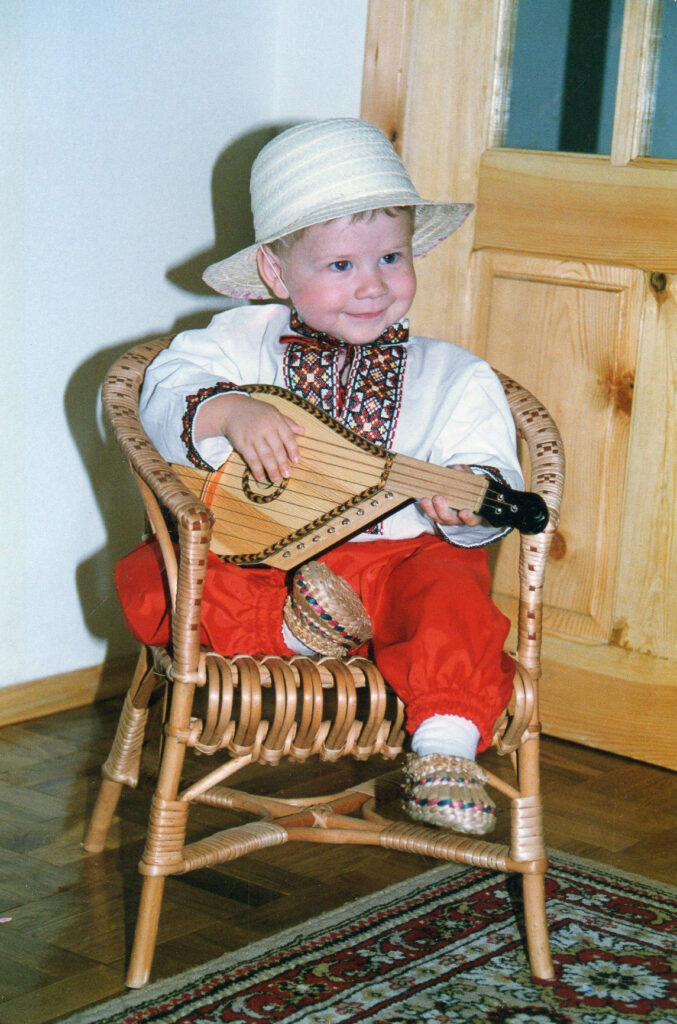
But I wasn’t fully home on this trip, because, though I have childhood memories of Kyiv, and everywhere we went still had the flavor of home, we couldn’t physically go to my home. My childhood home is in Simferopol, Crimea, which has been under Russian control since 2014. Being in Ukraine, yet not in Simferopol, made home feel out of reach. It was heartbreaking, and I was tearing up nearly every day thinking about it. On the plane ride to Europe, I watched the tracker as we flew over the Black Sea (the sea surrounding the Crimean Peninsula), and nearly wept, while all the other passengers snored or chuckled at their movies around me.
When I arrived in Ukraine, I met a lot of people with the same pain, people from Donetsk or Melitopol who had to flee as the Russians took over their cities. One of our translators, Mark, used to help pastor the largest church in Melitopol before the Russians came in 2022. The Russians mercilessly bombarded the city before occupying it, and then tried to force Mark and his dad to use their position in the church to inform on their congregants and promote Russian propaganda. They dragged Mark and his family, including his three boys, out of bed in the middle of the night, shoved guns in their faces, and demanded they work for them. He and the church leaders all refused. Thankfully, Mark and other leaders had already destroyed digital records of church attendance and information of those connected to their church. By the grace of God, Mark and his family were able to escape after weeks under Russian occupation, but not everyone there was so lucky. The Russians have since leveled every Protestant church in Melitopol, as they have done in the majority of occupied Ukraine. Mark is not sure when, or even if, he will be able to return home.
In Kyiv, we met a military mental health worker who told us of the thousands of soldiers who were coming back changed by the trauma of war. Many of their wives don’t even recognize the men they married. Often, their trauma causes them to inflict physical and emotional harm on their families, the very people they sacrificed to protect.
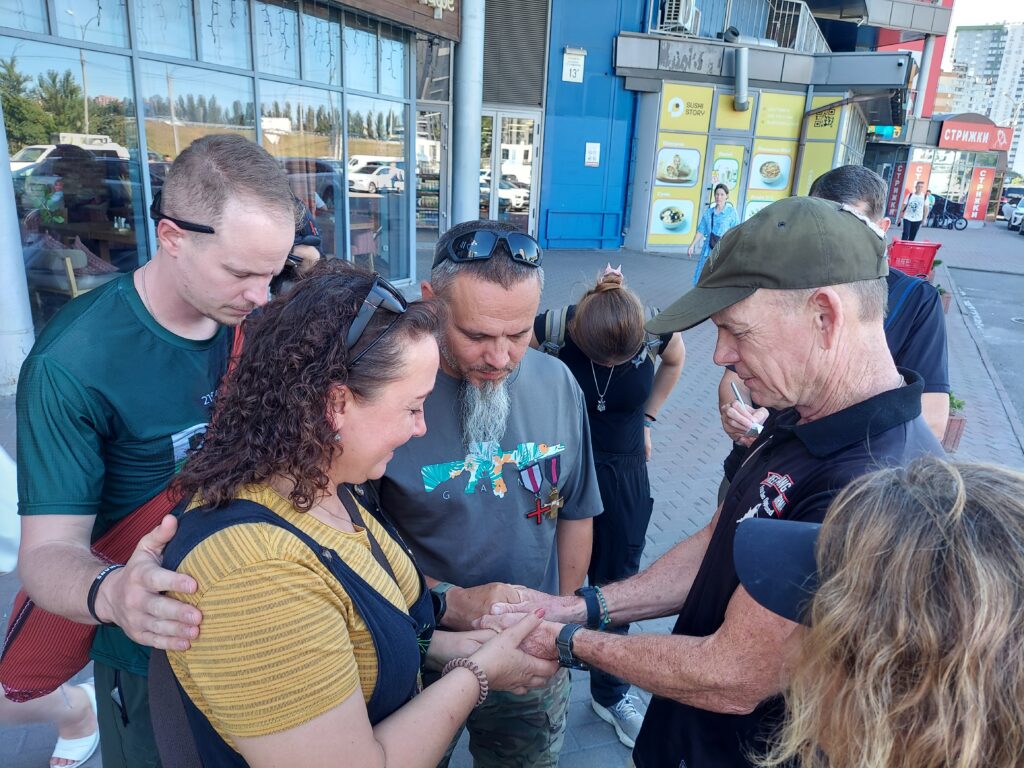
In Kharkiv, we met people who were moving out of a wrecked apartment building that had been hit by four Russian drone bombs the previous day. Throughout our team’s time in Ukraine, these drone bombs were a constant threat, whether we were near the frontlines in Donetsk Oblast or nearly 700km away in Kyiv.
A couple we talked with at the apartment had already lost their home once due to Russian attacks, and now had to start over again. When we offered them money, they declined to take it, saying they wanted it to go to their neighbors instead. The neighbors’ apartment had caught fire during the attack, burning the mother to death and leaving her two children in urgent care.
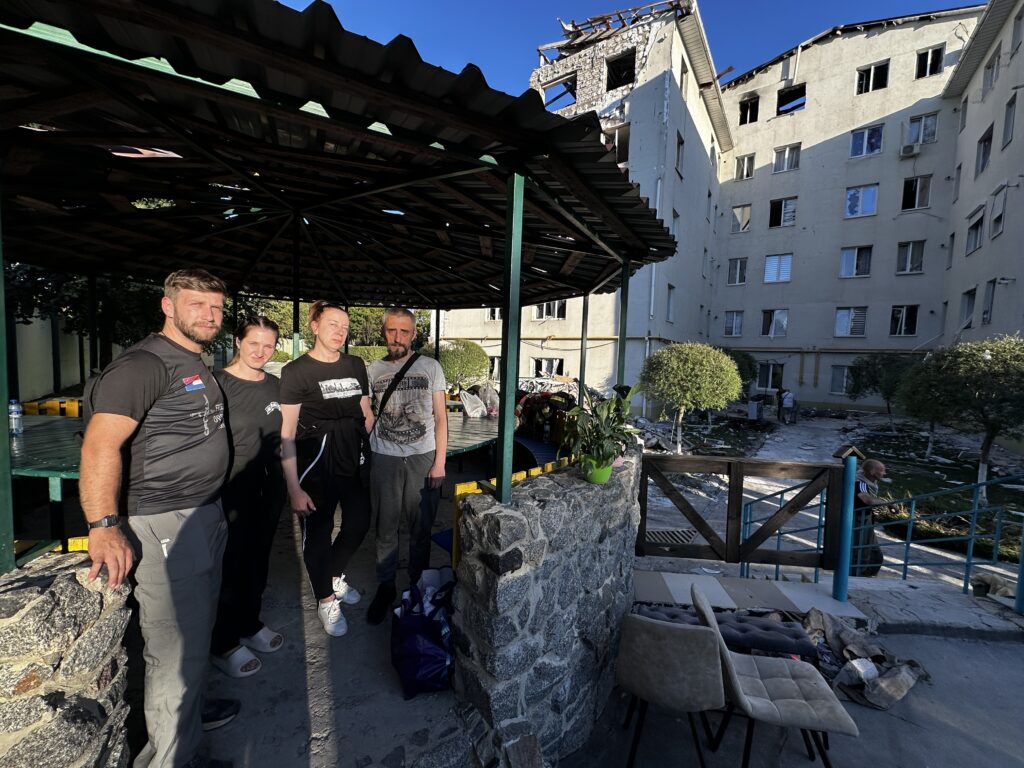
In Slovyansk, we were greeted on our arrival by a Russian drone bomb that loudly circled overhead before finding its target with a loud explosion in the distance. The Ukrainians around us barely reacted. Apparently, the possibility of a bomb falling on your head has become so routine that it’s no longer a good reason to stop your daily tasks. Our nights were punctuated by regular explosions, often far from us, but sometimes too close for comfort. On our last night in Slovyansk, two glide bombs fell 200 yards from where the team was staying, killing a local man. Everyone, on occasion, thinks as they fall asleep, “What if I die tonight? What if I just don’t wake up?” For the more than one million Ukrainians living within 20 miles of the front lines, that’s not a hypothetical question.
My initial instinct, when telling a story like this, is to find the hope in it. I tend to have an optimistic temperament. God teaches us to be content in all circumstances (Philippians 4:11), and He promises to turn mourning into dancing (Psalm 30:11). I do want to tell you about the hope we saw in Ukraine, but, first, I want to ask you to mourn with me.
When Jesus arrived at the tomb of Lazarus, He consoled Martha and Mary, He felt anger, and He wept. He knew that Lazarus would soon be walking out of that tomb, and yet, He still wept. The biblical account does not tell us how long He wept with them. I’m inclined to believe he took as long as he needed to. Martha and Mary’s grief wasn’t rushed. He could have ignored everyone, walked straight up to the tomb, and immediately called Lazarus out. There would have been no need for mourning then. But He didn’t skip to the hope and life. He joined in their pain first. For those of us who seek to follow Jesus, I think we’re called to do the same. When we encounter someone mourning, I think the Jesus thing to do is to join them. Would you please take some time with me, even if it’s only five minutes, to sit and pray through the pain that the people of Ukraine are experiencing?
Only after Jesus wept with them did he bring in hope and life. He miraculously called Lazarus out of the tomb, from death to life. Similarly, I see him bringing hope and life from the ashes in Ukraine. Not all at once, and not without further pain, but there is new life happening.
I met Max, the youngest chaplain in the Ukrainian Army. He served with a frontline unit, was wounded in combat, and had to go through reconstructive surgery and recovery for his arm. But he wanted to keep helping his people, so he became one of the few Protestant chaplains in the Ukrainian Army. I felt a huge amount of kinship with Max. We talked about our mutual love for Jesus, our desperate desire for the global church to live up to its calling, and our shared weight of feeling responsible for the wellbeing of those around us. He told me, “Once, one of my soldiers called me, but I was in a meeting and figured I’d call him back later. When I got the chance to call him back, he didn’t answer. I found out several days later that he had killed himself. Now, I never miss a phone call.” For Max, who is in his 20s, that is a huge weight to carry, but I get it. I have also had my fair share of last calls and talking people off a ledge. It’s easy to feel like their wellbeing is your responsibility. Thankfully, Jesus has ministered to me in this area, and I was able to pass that onto Max. Praise God! Max and I are people with different cultures and backgrounds, yet we know the same Jesus, and He makes us brothers despite our differences.
Another brother I met was Gary. He was a former Ukrainian Foreign Legion guy from England who joined our team in Kyiv. One night, he told me how Jesus found him and led him through life to be here with us. Gary was a quiet guy, yet his story came flowing out of him: the victories and trials, the blessings and the losses. It was not the kind of story you would build an encouraging sermon around. There were no morals or obvious themes. His losses were devastating and his blessings were rarely what he was asking for. I felt angry with God on his behalf at certain parts of his story. Yet, Gary finished by saying, “God is so faithful. He has been there every time in the big things and small. So I’m just going to keep following where He leads because I trust Him.” Again, praise God! Gary’s faith challenges me because he’s not just a story. He is a brother in Christ who I got to meet and serve beside. He’s present, not a distant biblical figure or an interesting biography. I shook his hand and shared meals with him.
These two men represent a lot of the people I met in Ukraine, true brothers and sisters I had never met before, yet felt like I knew intimately. They challenged me to grow by how real they and their faith are. Jesus is raising up a Ukrainian church that can speak with authority and wisdom on trusting God no matter the circumstance. Just like Lazarus, He is calling them out of the tomb, and their very existence points to Jesus if we are willing to see and listen. I’m begging you to listen to their stories. As Jesus said to the disciples, “Come and see.” The Ukrainian Church is making its voice heard through online services, news articles, new worship songs, and social media. You probably have Ukrainian believers in your city right now. If you’re worried about the state of the world, or maybe just the difficulties in your own life, come and see how Ukrainian believers are holding onto their faith. It will give you hope, and a model to follow, in your own times of mourning.
Thank you for your interest in what’s happening in Ukraine. Please pray for Jesus’s presence and peace to reign. Please pray that both the Ukrainian and Russian people will seek Jesus and reject hate. Pray for comfort for those who mourn and hope for those who feel broken.
Thank you and God bless you,
Daniel and The Free Burma Rangers

